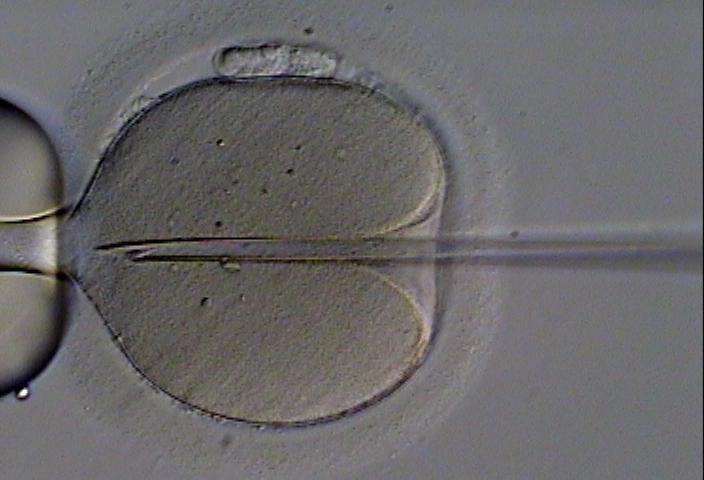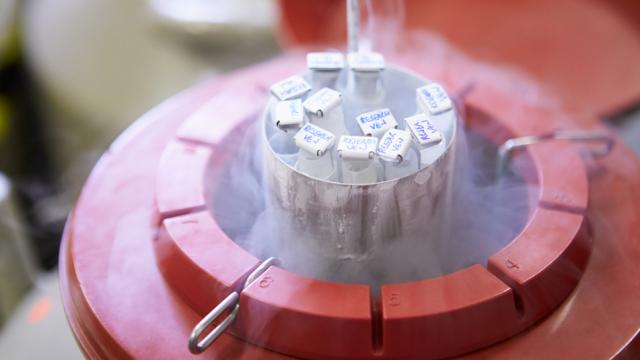The most prominent sperm bank in the UK is under investigation after turning away donors with dyslexia and other questionable characteristics. This raises an important question: Should sperm banks be in the business of making “better” babies?
Britain’s Human Fertilisation and Embryology Authority (HFEA), which regulates sperm banks, has launched a review of the London Sperm Bank after being alerted to its practices by The Guardian. The sperm bank is the largest in the UK and is accused of engaging in eugenics by banning men with dyslexia and other common conditions it describes as “neurological diseases”.
A booklet produced by the London Sperm Bank lists several questionable screening criteria, some of which may be in violation of British law and human rights standards.

A page from the London Sperm Bank pamphlet, via The Guardian
In addition to dyslexia, the booklet lists conditions such as attention deficit disorder (ADD), attention deficit hyperactivity disorder (ADHD), cerebral palsy, dyspraxia, multiple sclerosis, and Tourette Syndrome. It also mentions Down Syndrome, colour blindness, and a family history of Type 1 diabetes.
But some of the conditions listed, including cerebral palsy and dyslexia, are not linked — or are very weakly linked — to genetics.
At the same time, some experts question whether or not dyslexia, which affects upwards of 10 per cent of the population, should even be classified as a disability. Dyslexics, including prominent figures like Albert Einstein, Richard Branson, and Steve Jobs, are said to have benefited from the attendant cognitive attributes, including improved lateral thinking, spatial reasoning, and pattern recognition. (Similar concerns revolve around the appropriateness of banning donors with colour blindness, which affects as many as one in 12 males.)
The London Sperm Bank, it would appear, is adhering to an ableist and neurotypical bias, which the HFEA is now scrutinising. “The HFEA has never required or endorsed prohibiting people with dyslexia, dyspraxia, ADD, ADHD and other disorders from becoming sperm donors,” noted the HFEA in a statement. “The clinic’s HFEA inspector is clarifying our requirements for selecting donors with the centre, and is reviewing all the exemptions cited in the centre’s materials, to ensure that all future donors are treated fairly and in accordance with the law.”
In response, the London Sperm bank has pulled its booklet, saying it’s reviewing its practices and protocols.
But Is It Eugenics?
Given the accusations levied at the London Sperm Bank, it’s fair to ask if the company is actually engaging in eugenic practices. “Sperm banks have been in the business of screening with an eye toward producing healthier or more ‘perfect’ children for decades,” said NYU Langone Medical Center bioethicist Arthur Caplan. “It’s nothing new, they have been doing it for a long time.”

United States eugenics advocacy poster, circa 1926. (Credit: Philadelphia Sesqui-Centennial Exhibition, 1926)
Caplan makes the distinction between hard and soft eugenics, the former being more closely associated with Nazi Germany and the killing of so-called ‘undesirables’. Soft eugenics, or what’s often referred to as positive eugenics, is the attempt to make better babies. So, in the sense that sperm banks are promoting and encouraging the idea of having babies built to order, then yes, it can be referred to as a form of positive eugenics.
“In this case, customers are selecting for traits they want, and avoiding traits they don’t want,” Caplan explained to Gizmodo.
Bioethicist Nigel Cameron, the president of the Center for Policy on Emerging Technologies, says the practice is absolutely eugenics — and that sperm banks are starting to take it too far. “There is something inherently eugenic about assisted reproduction unless donations are accepted, by clinics and recipients, sight unseen,” he told Gizmodo. “When we take this to the extent they have, banning the colour blind, we are wading in deep.” He added, “And also, as this example shows, we are starting to be rather obviously stupid.”
According to James Hughes, the executive director of the Institute for Ethics and Emerging Technology, eugenics is unfortunately a broad term. “This is certainly an attempt to help parents have genetically healthier children, but it is not a coercive state policy mandating reproductive choices based on racist and classist pseudoscience,” he said. “So some would call it eugenics, and others would not.”
The Narrowing of Humanity
Canadian bioethicist Kerry Bowman, who teaches at the University of Toronto, worries that this kind of screening is counterproductive, and that it’s in opposition to shifting cultural and social norms.

Credit: Eugene Ermolovich (CRMI) / CC BY-SA 3.0
“I would absolutely state that it’s narrowing humanity at a time when we’re starting to accept many aspects of diversity,” he told Gizmodo. “Creativity has a high association with some of the things banned by sperm banks.”
Bowman says that some of our most treasured characteristics, such as innovation and creativity, are being undermined by these sorts of screening protocols. What’s more, he believes there are some definite human rights aspects to it as well. “The acceptance of broad aspects of human diversity is a great way to build healthy societies,” he said. “but we’re actually moving against that with some of these practices.”
The Wild West of Assisted Reproduction
Sperm banks are in the business of making money, so they’re doing their best to attract customers. If their marketing materials fail to impress prospective parents, or if they’re not screening for the “right” attributes, customers will take their business elsewhere. Trouble is, we’re currently living in the Wild West era of assisted reproduction, and sperm banks may be starting to abuse the lack of oversight.
According to Caplan, sperm banks, as well as egg sellers and donors essentially function in the US with almost no regulation. They’re required to look for things like transmissible diseases, such as HIV, but no one is required to check on their claims, or prove that the people used in their marketing materials are even representative of the real donors. Some of these sperm banks may even be using the same donor multiple times.
“It’s certainly wrong when sperm banks promise things that can’t be delivered, or when their claims fall outside of science, like suggesting certain traits are inherited when they’re not, like cerebral palsy,” said Caplan. “Deliberately misleading people, or classifying things as disorders, such as dyslexia and Asperger’s, which can many positive attributes, is a problem. At this point, they’re distorting and deceiving their customers. They’re basically saying that they’re going to help your offspring avoid a disease, when in fact there isn’t any medical opinion that says it’s a disease.”
“If you treat making children as a for-profit business, suddenly the legal attributes of for-profit business starts to leak into child building.” Arthur Caplan
Cameron shares these concerns. “The top Google search for sperm clinics yields an ad from one of the oldest firms touting its use of donors from only the top schools, and telling prospective clients how much choice they will have over the details of the donor,” he said.
Sperm banks are making promises to parents about their future children that can’t possibly be met.
Buyer Beware
Given that we’re talking about the free market, however, a strong case can be made that parents reserve the right to know what they’re purchasing.
To that end, Caplan says that parents should be able to access the genetic profile of the sperm they’re acquiring; they are paying for a product after all. But he says this sentiment is fuelling a fear that, by treating this domain like a business, it’s turning baby-making into a form of manufacturing. This could eventually lead to issues of product liability. Parents may sue a sperm facility for a product that failed to meet specifications, or worse, they may reject a child outright.
“If you treat making children as a for-profit business, suddenly the legal attributes of for-profit business starts to leak into child building,” he explained to Gizmodo.
So, should sperm come with genetic “warning labels”?
“Prospective parents have a right to know as much as possible about the quality, safety and efficacy of all the genetic manipulations they choose, and as much as is knowable about any sperm or ova they choose,” said Hughes.
“The right to know what kind of child you are making is fundamental to the right to control our own bodies, to reproductive rights, and to the right of parents to protect their children’s health and future. In assisted reproduction it is also encompassed in the medical ethic of informed consent.” James Hughes
Cameron is not quite on board with this idea. “This is not a standard consumer situation, even if a money-making clinic will tend to think it is,” he said. “We’re talking about enormous issues of human dignity that even in the UK — the most ‘liberal’ jurisdiction in the world on these issues — is recognised in law and regulatory regimes.”
Cameron says that talk of a parental “right to know” smacks of capitalism and may be misleading. Like Caplan, he worries that some parents may wish to return their product if it fails to please. “Yes, all baby-making should come with warning labels,” said Cameron, “including that your happiness and the child’s — and indeed, the child’s success, which is quite different, as this example shows — are likely to be unrelated to current decisions in our power.”
Finally, it’s important to acknowledge this issue as it pertains to our reproductive autonomy. “The right to know what kind of child you are making is fundamental to the right to control our own bodies, to reproductive rights, and to the right of parents to protect their children’s health and future,” Hughes told Gizmodo. “In assisted reproduction it is also encompassed in the medical ethic of informed consent.”
This incident clearly shows that oversight is desperately needed in this realm. Without tougher regulations, sperm banks will continue to overpromise and deceive their customers as a way to keep ahead of the competition. And by violating our laws and cultural norms, they’re causing us to step backwards instead of forwards.
Top image via Shutterstock
